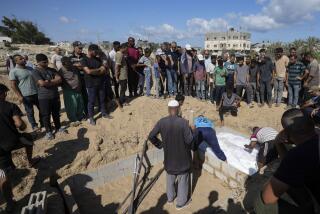Marines, Iraqis Say They Won’t Seal Grave Site
- Share via
HILLAH, Iraq — U.S. Marines offered Wednesday to aid recovery efforts at a mass grave site here, but they sided with Iraqis -- who want to rebury their dead quickly -- in rejecting calls to seal off the area so it can be searched methodically.
About 150 more bodies were dug from the site, bringing to 3,200 the number unearthed over the last five days. The mass grave is believed to be the largest yet found in Iraq.
Villagers say the victims were gunned down and buried, sometimes still alive, as part of ousted President Saddam Hussein’s moves to crush a 1991 rebellion by Shiite Muslims.
Townspeople overseeing the excavation said they would accept the Marines’ offer to bring water and shade tents for the volunteer workers and plastic bags for the remains. They turned down the loan of heavy equipment, saying the single backhoe being used was sufficient.
Iraqis also dismissed a plan, pressed by human rights groups, for the U.S. to seal off the site 50 miles south of Baghdad so forensic experts could thoroughly investigate it.
“According to our religion, we cannot leave these cadavers in this state,” said Dr. Rafid Husseni, who is helping coordinate the volunteers. “We must take them to proper places and rebury them immediately.
“Families,” he said, making a sweeping gesture at the throng of waiting Iraqis, “cannot wait for an investigation.”
Grave sites dug during Hussein’s reign are being found almost daily across Iraq, and the question of how to deal with them is one that U.S. and coalition partners are likely to face again.
Peter Bouckaert, a senior researcher with New York-based Human Rights Watch, lambasted the U.S. for not securing the 3-to-4-acre site here and dispatching investigators. He said the makeshift excavation was destroying evidence that could be used to identify victims and their killers.
“It’s an absolutely shameful failure on the part of the U.S. government,” Bouckaert said.
Villagers, however, say there is no mystery to solve. They contend that several families from the area employed private security forces and worked as executioners for the Hussein regime, being paid by the kill. A farmer living near the site, who said he witnessed the executions, directed others to the mass grave after the perpetrators fled following the U.S.-led invasion.
Many of the dead here were buried with their identification cards, which has helped Iraqis find their missing kin. In other cases, relatives are relying on shards of clothing and jewelry -- or even their instinct -- to identify victims.
“Even if he has no identification, no clothes, nothing, I will know my father when I hold his bones,” said Majid Hamid Moraab, 23. “I don’t want to wait for an investigation. I want my father’s bones.”
Moraab’s father, Hamid, was arrested in the spring of 1991 after the Shiite uprising, which Hussein’s regime swiftly quelled by killing thousands and arresting thousands more. The bodies of victims are believed to be scattered in mass graves outside dozens of towns and villages.
Like many of the dead, Hamid Moraab was a Shiite and a member of the Al Dawa Party, which opposed Hussein’s Baath Party. For a decade before the uprising, he was harassed and arrested, his home and other belongings confiscated and sold by the regime, family members said.
Hamid’s brother Hadi was similarly hounded and repeatedly arrested. Not long after he was detained in 1982, family members said, security officers delivered his body to the family home in the town of Mahawil, a few miles from here. He had been shot through the heart.
Moraab has searched for his father since 1991, visiting jails, prisons and government ministries. After Baghdad fell to coalition forces last month, he queried released prisoners. No one had seen his father. Now, each day, he comes to the grave site.
Workers say about half the bodies unearthed so far have been claimed, and most of those had identification papers. For other remains, mistakes seem certain to be made. Stories abound of relatives identifying their loved ones by such markers as a single arthritic finger bone, a steel surgical plate that held together a fractured femur, a broken tooth.
Marines stood guard near the site Wednesday, grenade launchers and machine guns at the ready.
Some officers took notes and photographs. They promised to return today with food and water, and mesh netting to offer some shade in the triple-digit heat. But they, too, seemed cool to the idea of ending the recovery now.
“We’re giving them what they want,” one Marine said as a woman searching for her husband called “Mohammed, Mohammed,” to the piles of remains. “This is their grave.”
Moraab did not find his father’s remains Wednesday. But if a single one of his bones is unearthed, he said, “I will know.”
*
Associated Press was used in compiling this report.
More to Read
Sign up for Essential California
The most important California stories and recommendations in your inbox every morning.
You may occasionally receive promotional content from the Los Angeles Times.












